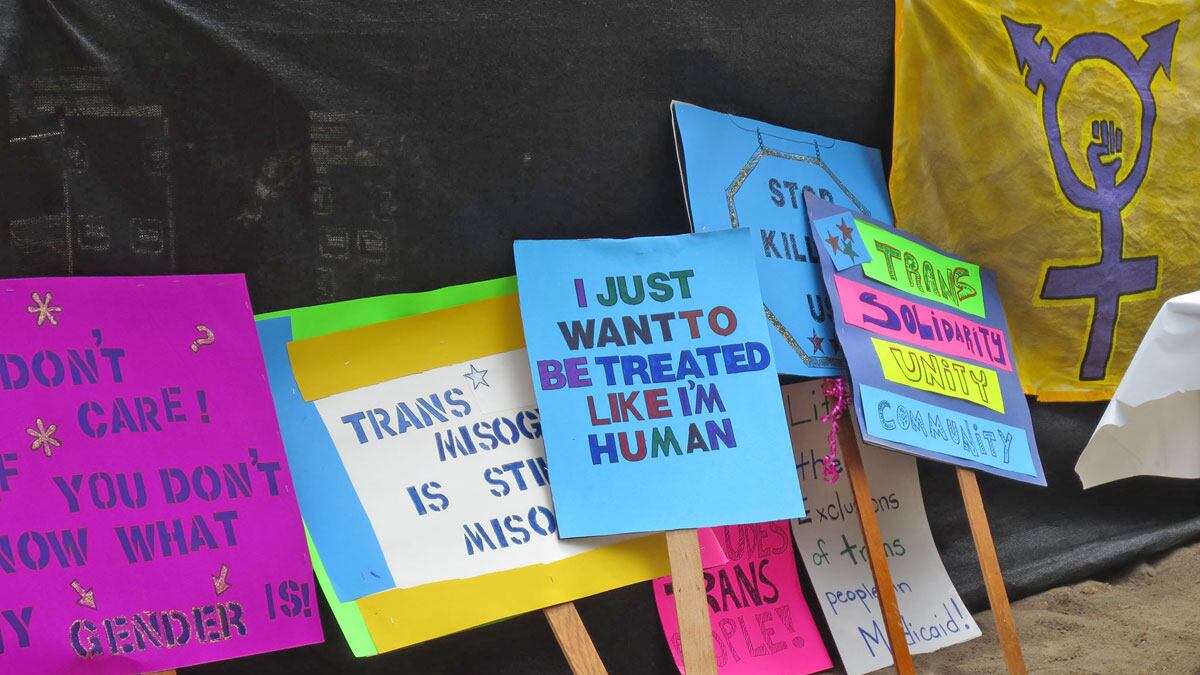The Portland Trans Pride March is now in its fifth year, and it might be the most important one yet.
While the march has always been a joyous, action-oriented event celebrating a community that has made tremendous gains in recent years, that community now faces a hostile presidential administration that's capable of reversing those rights at any time.
First formed in 2015, Greater Portland Trans Unity is a collective that recruits volunteers to help organize Trans Pride. WW spoke to three organizers—Lyles McFarland, Phyllicia Daria and Athen O'Shea—about why this year's march is so crucial.
WW: Why is Trans Pride so important right now?
Lyles McFarland: The gains that we've made are being taken away from us before our eyes. We just saw the ruling with the Supreme Court on the cake fiasco, and yeah, it was a narrow ruling, but it's still just another brick in the wall of all the things that are being thrown at us. Just having a place that we can gather and be ourselves and not be afraid is really powerful.

Phyllicia Daria: This administration is working very hard to undo all the gains we've made through government. They are trying to kick trans people out of the military, and now federal prisoners can't be housed according to their gender but only according to their assigned sex at birth, which is very scary and very dangerous for those people.
How do you see Trans Pride's role in the larger Pride movement and celebration?
Daria: Trans people historically have been pretty invisible within the larger queer community. We're a very small minority, and a very small community, and to have a separate trans march, separate from the huge Pride Parade where we would get lost in all the things going on, it's a big deal for us.
What are some of the issues facing the trans community, and have those changed in recent times?
McFarland: Prior to Trump being elected, it felt like trans rights were riding a wave that could not be beaten. After the Supreme Court ruling on gay marriage, a lot of people began to focus on trans rights, and we got the ability to change our Social Security numbers, our gender markers on state identification—and that affects everything, from health care to renting property to buying a home.
Daria: I was finally able to get a passport with my name and gender on it. I don't know how long that is going to last, because that was an administrative rule in the Obama administration and the Trump administration hasn't focused on it yet, but they very well could.

Athen O'Shea: People are once again having to jump through more and more hoops to get basic needs met. People are having a harder time in the shelter system, in the prison system, immigration. All of that comes down to very intentional systemic oppression.
What are your thoughts on the increased media coverage of violence against transgender people, including the death of Gigi Pierce here in Portland?
McFarland: In the past, they didn't cover us. Nowadays, we do get more coverage, and it kind of feels like people just cover it now because the culture has become obsessed with seeing horrible things but not doing anything about them.
Daria: The violence has always been there. It has always been dangerous to be trans, and there have always been murders of trans people. But the internet and 24-hours cable news have opened up a lot of channels for things to be reported that weren't reported before. But I don't know that the increased reporting has led to any benefits.
O'Shea: I get to come home to a safe, secure home every night. I'm not trying to navigate the shelter system, the immigration system or the prison system. So when we think about visibility, who is the most vulnerable? How do we politically mobilize around that?
What about people who would like to attend the march but are worried about safety?
McFarland: For the trans people that are worried about coming to the march and being safe, we are fully committed to safety. We have a really good track record with our safety team, and we've been building on each year's lessons so that we're feeling pretty good.

O'Shea: The march is incredibly fun. It's one of the ways we build ourselves up. It's amazing to be in the company of people marching affirmatively and powerfully for trans rights.
The Trans Pride March starts at Northwest 8th Avenue and Davis Street on Saturday, June 16, at 2 pm.

Q&A With Dyke March Organizer Belinda Carroll | Q&A With Queer Liberation Front Member Tony Hadden | Q&A with Greater Portland Trans Unity
Eleven Years and Multiple Venue Changes Later, Blow Pony Remains Portland's Wildest LGBTQ Dance Party | Five More Queer-Centric Dance Parties In Portland
An All-Portland Pride Playlist | A Pride Events Calendar
Portland Still Has Work To Do in Meeting LGBTQ Mental Health Care Needs
When I Had No Place Else To Go, I Lived in One of Portland's Last Bathhouses

